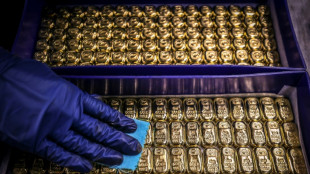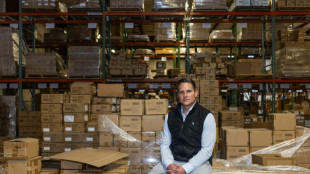
-
 Gold hits record, dollar drops as tariff fears dampen sentiment
Gold hits record, dollar drops as tariff fears dampen sentiment
-
As Dalai Lama approaches 90, Tibetans weigh future

-
 US defense chief shared sensitive information in second Signal chat: US media
US defense chief shared sensitive information in second Signal chat: US media
-
Swede Lingblad gets first win in just third LPGA start

-
 South Korea ex-president back in court for criminal trial
South Korea ex-president back in court for criminal trial
-
Thunder crush Grizzlies, Celtics and Cavs open NBA playoffs with wins

-
 Beijing slams 'appeasement' of US in trade deals that hurt China
Beijing slams 'appeasement' of US in trade deals that hurt China
-
Trump in his own words: 100 days of quotes

-
 Padres say slugger Arraez 'stable' after scary collision
Padres say slugger Arraez 'stable' after scary collision
-
Trump tariffs stunt US toy imports as sellers play for time

-
 El Salvador offers to swap US deportees with Venezuela
El Salvador offers to swap US deportees with Venezuela
-
Higgo holds on for win after Dahmen's late collapse

-
 El Salvador's president proposes prisoner exchange with Venezuela
El Salvador's president proposes prisoner exchange with Venezuela
-
Gilgeous-Alexander, Jokic, Antetokounmpo named NBA MVP finalists

-
 Thomas ends long wait with playoff win over Novak
Thomas ends long wait with playoff win over Novak
-
Thunder rumble to record win over Grizzlies, Celtics top Magic in NBA playoff openers

-
 Linesman hit by projectile as Saint-Etienne edge toward safety
Linesman hit by projectile as Saint-Etienne edge toward safety
-
Mallia guides Toulouse to Top 14 win over Stade Francais

-
 Israel cancels visas for French lawmakers
Israel cancels visas for French lawmakers
-
Russia and Ukraine trade blame over Easter truce, as Trump predicts 'deal'

-
 Valverde stunner saves Real Madrid title hopes against Bilbao
Valverde stunner saves Real Madrid title hopes against Bilbao
-
Ligue 1 derby interrupted after assistant referee hit by projectile

-
 Leclerc bags Ferrari first podium of the year
Leclerc bags Ferrari first podium of the year
-
Afro-Brazilian carnival celebrates cultural kinship in Lagos

-
 Ligue 1 derby halted after assistant referee hit by projectile
Ligue 1 derby halted after assistant referee hit by projectile
-
Thunder rumble with record win over Memphis in playoff opener

-
 Leverkusen held at Pauli to put Bayern on cusp of title
Leverkusen held at Pauli to put Bayern on cusp of title
-
Israel says Gaza medics' killing a 'mistake,' to dismiss commander

-
 Piastri power rules in Saudi as Max pays the penalty
Piastri power rules in Saudi as Max pays the penalty
-
Leaders Inter level with Napoli after falling to late Orsolini stunner at Bologna

-
 David rediscovers teeth as Chevalier loses some in nervy Lille win
David rediscovers teeth as Chevalier loses some in nervy Lille win
-
Piastri wins Saudi Arabian Grand Prix, Verstappen second

-
 Kohli, Rohit star as Bengaluru and Mumbai win in IPL
Kohli, Rohit star as Bengaluru and Mumbai win in IPL
-
Guirassy helps Dortmund past Gladbach, putting top-four in sight

-
 Alexander-Arnold lauds 'special' Liverpool moments
Alexander-Arnold lauds 'special' Liverpool moments
-
Pina strikes twice as Barca rout Chelsea in Champions League semi

-
 Rohit, Suryakumar on song as Mumbai hammer Chennai in IPL
Rohit, Suryakumar on song as Mumbai hammer Chennai in IPL
-
Dortmund beat Gladbach to keep top-four hopes alive

-
 Leicester relegated from the Premier League as Liverpool close in on title
Leicester relegated from the Premier League as Liverpool close in on title
-
Alexander-Arnold fires Liverpool to brink of title, Leicester relegated

-
 Maresca leaves celebrations to players after Chelsea sink Fulham
Maresca leaves celebrations to players after Chelsea sink Fulham
-
Trump eyes gutting US diplomacy in Africa, cutting soft power: draft plan

-
 Turkey bans elective C-sections at private medical centres
Turkey bans elective C-sections at private medical centres
-
Lebanon army says 3 troops killed in munitions blast in south

-
 N.America moviegoers embrace 'Sinners' on Easter weekend
N.America moviegoers embrace 'Sinners' on Easter weekend
-
Man Utd 'lack a lot' admits Amorim after Wolves loss

-
 Arteta hopes Arsenal star Saka will be fit to face PSG
Arteta hopes Arsenal star Saka will be fit to face PSG
-
Ukrainian troops celebrate Easter as blasts punctuate Putin's truce

-
 Rune defeats Alcaraz to win Barcelona Open
Rune defeats Alcaraz to win Barcelona Open
-
Outsider Skjelmose in Amstel Gold heist ahead of Pogacar and Evenepoel


What we know about how 'forever chemicals' affect health
Invisible, omnipresent "forever chemicals" have been linked to a wide range of serious effects on human health, prompting growing calls for them to be banned.
While there is firm evidence that at least one of the more than 4,000 human-made chemicals called PFAS causes cancer, researchers are still attempting to fully understand their broader impact on health.
Here is what we know so far.
- What are PFAS? -
Per- and polyfluoroalkyl substances (PFAS) are synthetic chemicals that were first developed in the 1940s to withstand intense heat and repel water and grease.
They have since been used in a vast range of household and industrial products including food packaging, make-up, stain-proof fabric, non-stick pots and pans and foam used to fight fires.
Because PFAS take an extremely long time to break down -- earning them the nickname "forever chemicals" -- over the years they have seeped into the soil and groundwater, getting into our food chain and drinking water in the process.
These chemicals have now been detected virtually everywhere on Earth, from the top of Mount Everest to inside human blood and brains.
- Two biggest culprits -
The two most researched PFAS compounds have already been banned or restricted in many countries, though they remain detectable throughout the environment.
Perfluorooctanoic acid (PFOA), which was once used to make the non-stick cookware coating Teflon, was in December classified as "carcinogenic to humans" by the International Agency for Research on Cancer (IARC).
The World Health Organization agency said there is "sufficient evidence" that PFOA gave animals cancer during experiments, as well as "limited evidence" of renal cell and testicular cancer in humans.
Perfluorooctane sulfonic acid (PFOS) -- once the key ingredient in the Scotchgard fabric protector -- was meanwhile ruled "possibly carcinogenic to humans".
There was limited proof of cancer in animals but "inadequate evidence regarding cancer in humans", the IARC said.
- Other linked diseases -
More broadly, observational studies have suggested that exposure to PFAS chemicals is associated with an increased rate of cancer, obesity, thyroid, liver and kidney disease, higher cholesterol, low birth weight, infertility and even a lower response to vaccines.
But such observational research cannot prove that the chemicals directly cause these health problems.
And the level of risk can vary greatly depending on the level of PFAS people are exposed to -- almost everyone on Earth is believed to have at least a little PFAS in their bodies.
According to the IARC, most at risk for serious PFAS exposure are people who directly work with the chemicals while making products.
- Question of exposure -
Exactly what level of PFAS exposure is hazardous to health has been a matter of debate.
Previously, guidelines in numerous countries ruled that having less than 100 nanogrammes of PFAS per litre of tap water was enough to protect health.
But the United States has proposed lowering the limit to four nanogrammes of PFOA and PFOS per litre -- and the EU is considering following suit.
Last year, a media investigation found PFAS levels over 100 nanogrammes per litre at 2,100 sites across Europe and the UK.
The level soared over 10,000 nanogrammes at 300 of the sites, according to the investigation carried out by 16 newsrooms.
- 'Chemical whack-a-mole' -
Further complicating the ability of research to comprehend the health effects of PFAS is that new compounds are still being developed.
As manufacturers phase out compounds identified as potentially hazardous, they sometimes simply replace it with another member of the PFAS family that has been studied less, researchers have warned.
Harvard environmental researcher Elsie Sunderland has called this process "chemical whack-a-mole".
- Calls for action -
Environmentalists and health experts across the world have been increasingly sounding the alarm about forever chemicals.
On Thursday, French MP Nicolas Thierry will introduce a bill that -- if passed -- would ban non-essential PFAS in France from 2025.
The European Union is also considering a Europe-wide ban on PFAS from as early as 2026.
- What can you do? -
For people at home, it is nearly impossible to avoid consuming miniscule amounts of PFAS.
But experts recommend reducing contact with non-stick cookware and grease-proof food packaging such as fast food wrappers.
Drinking filtered or bottled water and storing leftovers in glass -- not plastic -- containers could also help.
E.Gasser--VB




